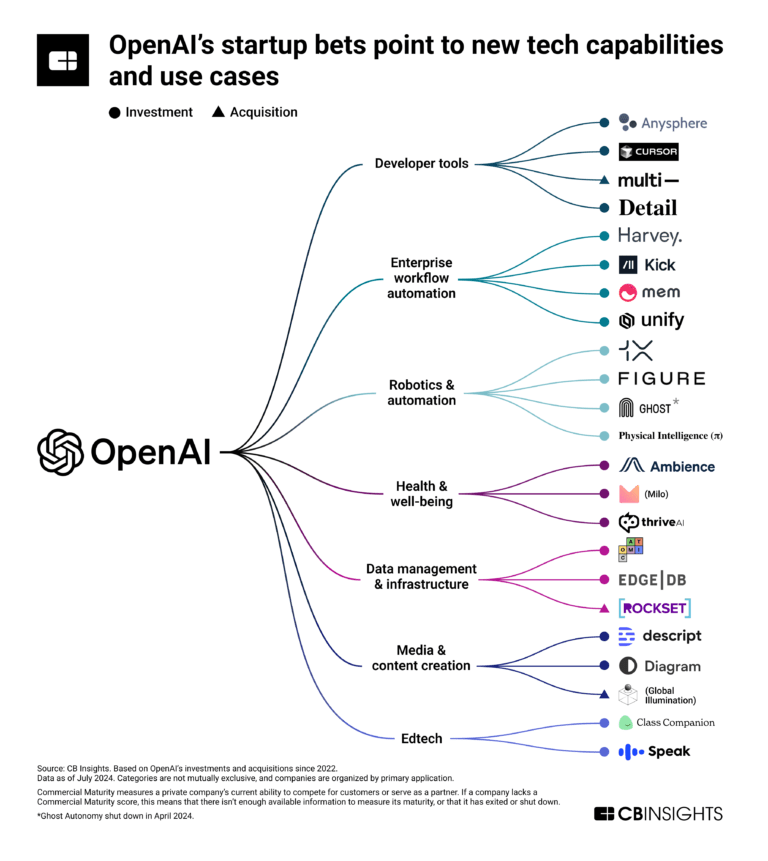
Physical Intelligence
Founded Year
2024Stage
Series A | AliveTotal Raised
$470MValuation
$0000Last Raised
$400M | 4 mos agoAbout Physical Intelligence
Physical Intelligence focuses on integrating general-purpose artificial intelligence with physical systems in various industries. Its main offerings include foundation models and learning algorithms designed to enhance the capabilities of robots and other physically actuated devices. The company primarily serves sectors that utilize advanced robotics and automation technologies. It was founded in 2024 and is based in San Francisco, California.
Loading...
Loading...
Research containing Physical Intelligence
Get data-driven expert analysis from the CB Insights Intelligence Unit.
CB Insights Intelligence Analysts have mentioned Physical Intelligence in 2 CB Insights research briefs, most recently on Dec 10, 2024.

Dec 10, 2024 report
$1B+ Market Map: The world’s 1,249 unicorn companies in one infographicExpert Collections containing Physical Intelligence
Expert Collections are analyst-curated lists that highlight the companies you need to know in the most important technology spaces.
Physical Intelligence is included in 2 Expert Collections, including Artificial Intelligence.
Artificial Intelligence
7,146 items
Unicorns- Billion Dollar Startups
1,257 items
Latest Physical Intelligence News
Jan 6, 2025
By grappling with the messy and unpredictable side of existence, machine learning can have impact beyond the digital. Save Recent AI models are surprisingly humanlike in their ability to generate text, audio, and video when prompted. However, so far these algorithms have largely remained relegated to the digital world, rather than the physical, three-dimensional world we live in. In fact, whenever we attempt to apply these models to the real world even the most sophisticated struggle to perform adequately—just think, for instance, of how challenging it has been to develop safe and reliable self-driving cars. While artificially intelligent, not only do these models simply have no grasp of physics but they also often hallucinate, which leads them to make inexplicable mistakes. READ MORE This story is from the WIRED World in 2025 , our annual trends briefing. This is the year, however, when AI will finally make the leap from the digital world to the real world we inhabit . Expanding AI beyond its digital boundary demands reworking how machines think, fusing the digital intelligence of AI with the mechanical prowess of robotics. This is what I call “physical intelligence”, a new form of intelligent machine that can understand dynamic environments, cope with unpredictability, and make decisions in real time. Unlike the models used by standard AI, physical intelligence is rooted in physics; in understanding the fundamental principles of the real world, such as cause-and-effect. Such features allow physical intelligence models to interact and adapt to different environments. In my research group at MIT, we are developing models of physical intelligence which we call liquid networks. In one experiment, for instance, we trained two drones—one operated by a standard AI model and another by a liquid network—to locate objects in a forest during the summer, using data captured by human pilots. While both drones performed equally well when tasked to do exactly what they had been trained to do, when they were asked to locate objects in different circumstances—during the winter or in an urban setting—only the liquid network drone successfully completed its task. This experiment showed us that, unlike traditional AI systems that stop evolving after their initial training phase, liquid networks continue to learn and adapt from experience, just like humans do. Physical intelligence is also able to interpret and physically execute complex commands derived from text or images, bridging the gap between digital instructions and real-world execution. For example, in my lab, we’ve developed a physically intelligent system that, in less than a minute, can iteratively design and then 3D-print small robots based on prompts like “robot that can walk forward” or “robot that can grip objects”. Other labs are also making significant breakthroughs. For example, robotics startup Covariant, founded by UC-Berkeley researcher Pieter Abbeel, is developing chatbots—akin to ChatGTP—that can control robotic arms when prompted. They have already secured over $222 million to develop and deploy sorting robots in warehouses globally. A team at Carnegie Mellon University has also recently demonstrated that a robot with just one camera and imprecise actuation can perform dynamic and complex parkour movements—including jumping onto obstacles twice its height and across gaps twice its length—using a single neural network trained via reinforcement learning. If 2023 was the year of text-to-image and 2024 was text-to-video, then 2025 will mark the era of physical intelligence, with a new generation of devices—not only robots, but also anything from power grids to smart homes—that can interpret what we’re telling them and execute tasks in the real world. Most Popular
Physical Intelligence Frequently Asked Questions (FAQ)
When was Physical Intelligence founded?
Physical Intelligence was founded in 2024.
Where is Physical Intelligence's headquarters?
Physical Intelligence's headquarters is located at 396 Treat Avenue, San Francisco.
What is Physical Intelligence's latest funding round?
Physical Intelligence's latest funding round is Series A.
How much did Physical Intelligence raise?
Physical Intelligence raised a total of $470M.
Who are the investors of Physical Intelligence?
Investors of Physical Intelligence include Thrive Capital, OpenAI Startup Fund, Lux Capital, Sequoia Capital, Khosla Ventures and 7 more.
Who are Physical Intelligence's competitors?
Competitors of Physical Intelligence include Trans-N and 4 more.
Loading...
Compare Physical Intelligence to Competitors

Cognitive Engines offers artificial intelligence technology for industrial robotics and healthcare sectors. The company provides AI algorithms. It enables industrial robots to interact with human operators, support physical tasks, and integrate non-digital staff into production processes. It was founded in 2019 and is based in Cestas, France.
Artificialy specializes in artificial intelligence solutions within the technology sector. The company offers AI-driven services such as industrial machine and process optimization, predictive maintenance, strategic marketing, computer vision, and advanced image analysis, as well as natural language processing and large language models for various business applications. Artificialy primarily serves sectors that require advanced AI integration to enhance business efficiency and performance. It was founded in 2020 and is based in Lugano, Switzerland.

Landing AI offers a software platform that provides visual prompting for a range of applications. Its product includes an end-to-end artificial intelligence (AI) platform specifically designed for industrial customers to build and deploy AI visual inspection solutions. The company was founded in 2017 and is based in Palo Alto, California.

SLAMcore specializes in spatial intelligence and operates in the technology sector. It focuses on real-time location systems (RTLS) and autonomous vehicle operation. The company offers products such as Slamcore Aware and Slamcore software development kit (SDK), which provide vision-based positioning and spatial understanding using stereo cameras, inertial sensors, and advanced artificial intelligence (AI) algorithms. Its solutions are designed for tracking and situational awareness in various environments, catering to industries that require robust vehicle and robot localization. It was founded in 2016 and is based in London, United Kingdom.
RGo Robotics specializes in artificial perception technology for mobile robots. The company's main product, the Perception Engine, provides mobile robots with the ability to understand complex surroundings and operate autonomously, similar to human perception. It primarily serves sectors such as warehouse automation, last-mile delivery, outdoor machinery, and service robots. It was founded in 2018 and is based in Cambridge, Massachusetts.

1X focuses on developing humanoid robotics to address global labor demands within various sectors. It offers androids designed to work alongside human teams, performing tasks that range from logistics to retail with human-like movements and behaviors. The androids are equipped with AI that allows them to learn and improve task performance over time, and they are tested for safety and functionality before deployment. 1X was formerly known as Halodi Robotics. It was founded in 2014 and is based in Oslo, Norway.
Loading...
